

Last updated on
August 14, 2023
Ecommerce has taken the business world by storm. Everyone wants to become the next Jeff Bezos, creating an eCommerce empire to build their fortune. But we all have to start somewhere, and it’s rare to be able to create your custom store right out of the gate.
Many people turn to Shopify, one of the world’s most popular eCommerce platforms. With Shopify, you can create the store of your dreams, making your mark on the online shopping world as you build your presence and scale upward.
But Shopify trends have shifted lately, with many turning to Shopify landing pages to help push specific products.
Landing pages are website pages that customers “land on,” usually after clicking on an ad or offer. The page usually focuses on specific offers and hypes a particular product or service.
The purpose of a landing page is to push a prospective customer to the next stage of your sales funnel. This can look quite different depending on the company and its specific funnel.

A Shopify landing page is connected to your Shopify store and can be used to push your next big promotion or product.
These landing pages typically have the following:
Shopify landing pages are so effective because they’re focused. When you have a page dedicated to one product or offer, you remove other distracting offers and allow your potential customer to focus on a singular item.
You can also use your Shopify landing pages to create a more personalized experience for potential customers. You can connect these pages to targeted ads on Facebook or the Google Ads platform.
You can also customize the landing page to fit more with the aesthetic of your ad. For example, suppose you're running a Memorial Day sale filled with beach imagery and summertime vibes.
Shopify landing pages also allow you to run A/B tests, where you create two different versions of the same landing page and monitor which one does better. It can help you improve your conversion rates and give you more insight into your audience.
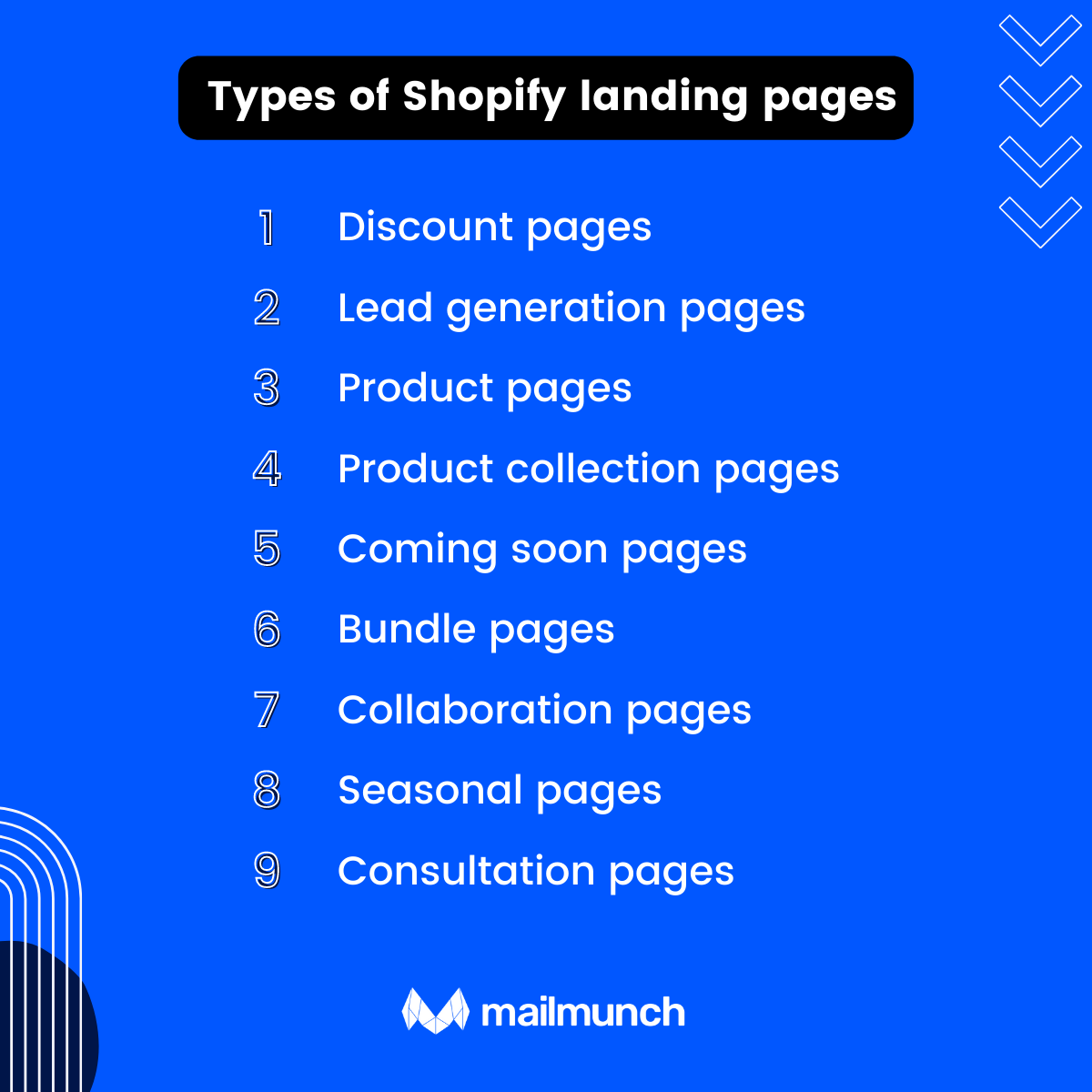
Discount pages, also known as special offer pages, are spaces where you can hype specific offers you’re running. This could be a holiday-related sale or just a regular special offer that you’re trying to push out to boost the sales of a specific product.

This is also a great place to list some testimonials from satisfied customers to generate social proof.
You can also use discount pages to generate leads. For example, you could try offering a coupon for 20% off on a future purchase if someone provides you with their contact information.
As we just briefly touched on, you can use your Shopify landing pages as a means of lead generation. This doesn’t have to include a discount, like in our previous section, but it does help to incentivize the process.
The purpose of a lead generation landing page is to acquire customer information for future marketing. This can include the person’s name, address, email, phone number, and more.
Product landing pages are pages that focus on one specific product. It’s different from a regular product page through your Shopify store, as those are often uniform and structured like every other product page.
The landing page gives you more creative freedom and allows you to spread your wings more. As mentioned earlier, you can match the theming of these pages to the ad campaign that drew customers to you. It’s also possible to create different layouts that draw attention to the product, such as videos, testimonials, and more.
You can catch potential customers' attention with a huge headline and sub-header.
Shopify landing pages can be a great place to showcase a collection of different products from the same line.
You can have different areas of the page focusing on different products and even a video showing off the entire line together. These special offer bundles can be discounted when bought together, creating more incentive to buy the entire product collection.
Coming soon, Shopify landing pages are created to hype products that haven’t hit the digital shelves.
You can show off these products and invite your users to either pre-order them or just sign up with an email address for more information on the product’s eventual release. This can serve a dual purpose as a lead generation landing page.
Bundle pages are very similar to collection pages. On a collection page, you list various products from the same line. On a bundle page, that’s not necessarily the case.
You can include several products that match up together for a single purpose. For example, you could bundle different tools that customers need when doing home repairs or various toiletries that someone would want to pack in a travel bag before a big trip.
If you’re working with another company, you can come together to create a landing page that showcases your different products coming together. Customers can learn more about both companies on this page and eventually use that information to make a purchase decision.
This landing page can also include celebrity or influencer endorsements. If, for example, a popular Instagram or YouTube star is endorsing your products, you can feature their posts and videos on the landing page to show off the collaboration.
If you run specific seasonal offers, you should create landing pages about them. Something like a yearly holiday sale that runs from Thanksgiving to New Year should have a unique feel that adequately conveyed through a landing page.
This is especially true if you run the same seasonal promotions every year.
A consultation landing page helps you push consulting services. If you’re helping customers navigate your product catalog, a landing page can be an excellent place to sign up for additional information.
This also allows you to get their contact information, which counts as a lead generation landing page.

Shopify allows users to create landing pages through its platform, though this has often been described as a more limited pathway that might not allow you to stretch your creative muscles fully.

You can start creating your landing page through Shopify by using the theme editor to create a landing page template.
Customization is essential when designing any landing page. With the Shopify website builder, you can create dedicated sections with the right images and copy based on each of your products. You can add poster templates with effective CTAs to your landing product pages to help boost engagement and conversions.
Liquid is Shopify’s open-source template language that was written using Ruby. If you are well-versed in Liquid, you can use custom code to create the landing page of your dreams. However, this does require a lot of coding knowledge and isn’t recommended for rookie developers.

If you have your heart set on this approach, you can also hire a developer to do the work for you. Remember that this will be an additional expense that eats into your Shopify profits.
Landing page builders are specifically designed to help you create custom landing pages that can be connected to your Shopify website.
These platforms are specifically designed to help those without coding knowledge produce quality landing pages that speak to the needs of their audience. Mailmunch is one such platform that can help you create a landing page to draw in customers, subscribers, and new leads and even segment your audience effectively.
We have templates designed for various industries like health and wellness, consumer goods, fashion, cosmetics, and more.

The first thing that a customer will see when clicking on your Shopify website is your headline. So, to that end, make sure that the headline is powerful and grabs your audience's attention.
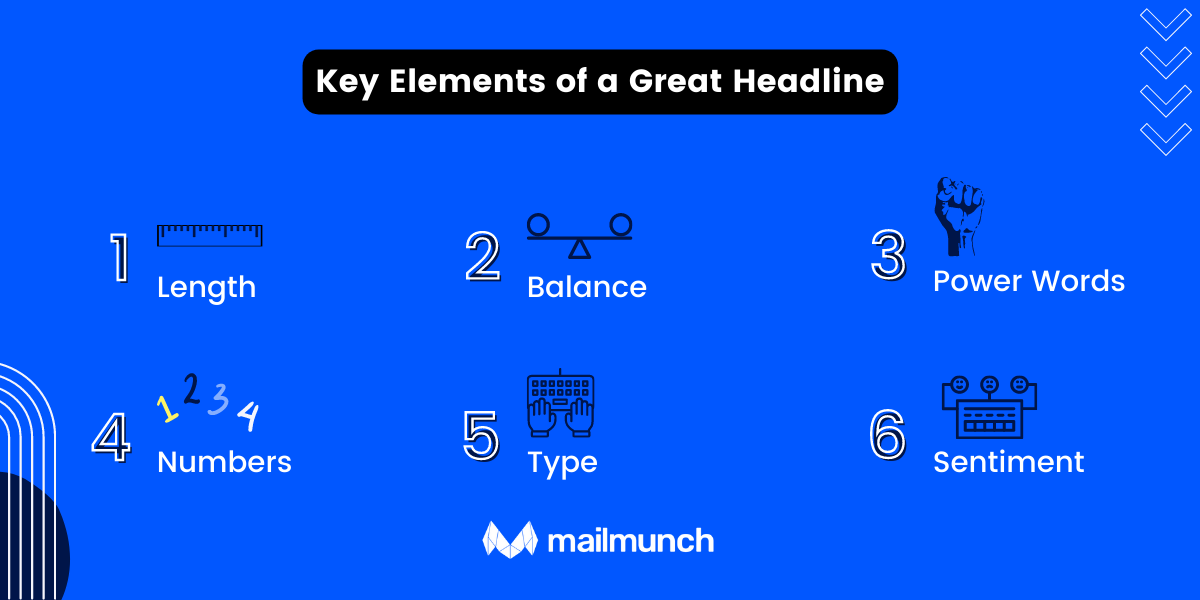
When writing a headline, try to figure out how you can grab someone’s attention while still putting over the main benefits of your product. If you can overcome an objection at the same time, even better.
Your subheader is where you can explain a bit more, expanding on what you said in your headline. The headline aims to get the user to look at the sub-header. The goal of the sub-header is to fully hook the user into scrolling further.
When going on to describe your products and convince the audience that this is something they need, you can’t go wrong by highlighting your features and how they can benefit they customers.
Usually, when tips are given for improving conversions, the strategy focuses on great visual aesthetics, promotions, influencer partnerships, and so on. They rarely address the product or service description, which is ultimately a space where you can detail the features and benefits of your products and address issues that might give a buyer pause.
Tools like product description generators can help you with this if you’re not a writer. You’ll be able to create descriptions that make customers want to buy from you, bulldozing through their objections and instilling a sense of confidence in your buyers.
Social proof is extremely effective on a landing page, especially when you’re trying to push a product. Social proof can come in product reviews or, even better, video testimonials showing customers using your products to alleviate the same pain points your ideal prospects face.
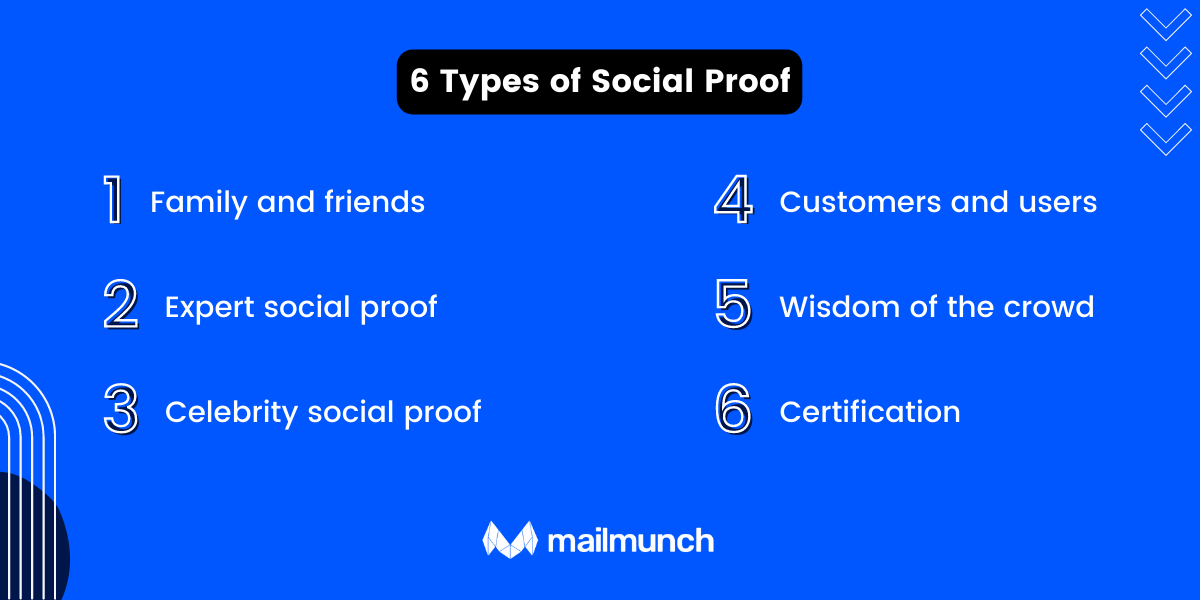
Luxury Presence, a company specializing in web design and SEO services for real estate, suggests displaying short testimonial videos to showcase social proof and instill a sense of trust in your audience. This kind of strategy generates more credibility, directly improving landing page conversion rates.
If your landing page is going to redirect customers to your Shopify page, make sure they understand what the next steps will look like.
You don’t want them to click on your CTA and suddenly abandon the funnel because they’re confused by the process. Make sure that before they click, they know exactly what to expect, how the checkout and shipping process works, and how long it will take for them to receive their items.
If you want people to take action on your landing page, you have to push them along the path to conversion. This can be done with a powerful call to action.
Your CTA should be centrally located and stand out. Make it visible immediately without scrolling, and consider making it a different color to draw the eye. It should be large and pop out against the page's overall design so that there’s no question in the user’s mind as to what needs to be done next.
Determine what your frequently asked questions might be for each landing page and address those questions near the bottom.
You should highlight the questions and then provide detailed answers below, providing resources and links to other pages on your site for additional information.
Link them to your “terms and conditions page” as well, as this should be a legal agreement between your site and its users that establishes acceptable behavior from a user. Some existing terms and conditions templates can be added to the site with ease and help better protect your business.

PooPouri’s odor-eliminating products allow you to create your own bundle. You can see stunning imagery, strong social proof, and a clear call to action right when you access the page.

This website features a top 10 questions about hair extensions that customers can peruse to gain more information. There’s also a video playing in the upper right corner and a clear call to action, drawing people to the shop.

Studio Neat took a simple approach with the main hero image of its most significant product, a clear headline explaining what it is, and a CTA right underneath that stands out. As you scroll the page, you can find information on related products.

Speaking of minimalist approaches, Holstee has a large headline and subheader and gives a lot of information. The subheader even contains links that can push users where they need to go.
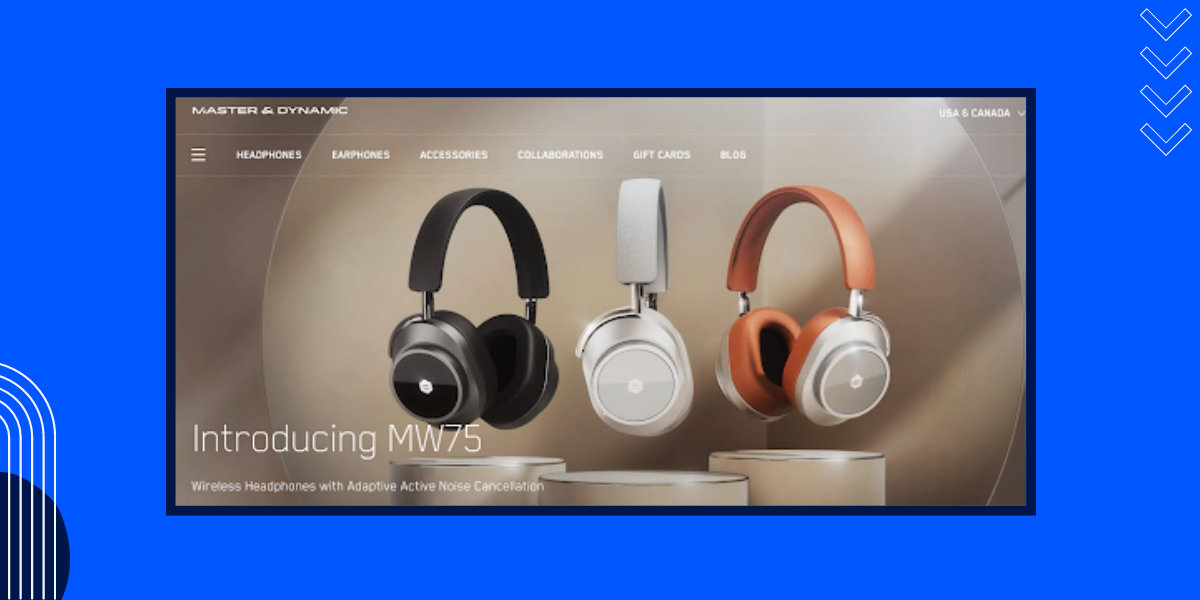
Master & Dynamics page has a fully immersive background image with a solid headline, subheader, and call to action, all without having to scroll. This top section also changes periodically to highlight different products.

Flow is a beekeeping product that gives you a strong headline, subheader, and CTA right up front, along with social proof supplied on the side through reviews and rotating images.
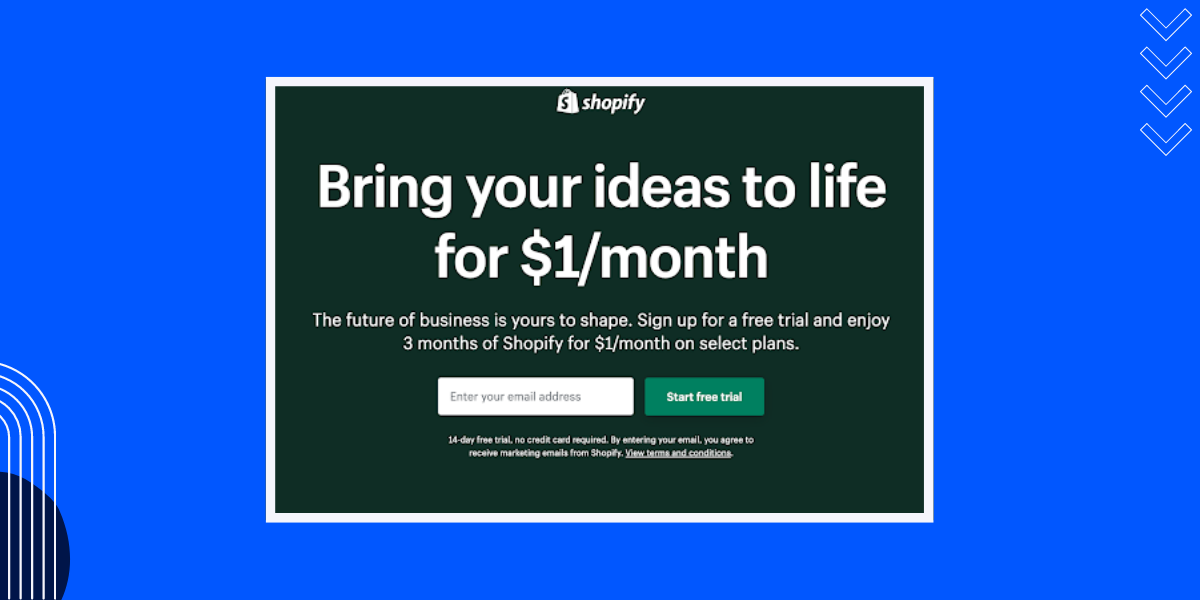
It makes sense that Shopify would have one of the best Shopify landing pages. It’s a simple design with an eye-catching headline, an informative subheader, a lead capture box, and a clear call to action that pops out.

Monk Manual offers a simple headline and subheader with a calming background photo, social proof, and a clear call to action that pops out on the page without having to scroll.

Kettle & Fire has a great header image with a simple headline and subheader. The CTA is visible, and a small present button in the left corner provides a discount offer.

Outdoor Voices has a soothing image that shows off its products in a serene setting along with your standard headline, subheader, and CTA. There’s also a popup offer that hits when you go to the site that gives 20% off your first order of $100 or more by entering your email address.

The Rocky Mountain Soap Co. pushes a collection up front with a clear CTA. A lead generation form also pops up in the lower left-hand corner.

United By Blue takes a humorous approach to promote its product with an image, a headline that can make you chuckle, and a CTA that plays into the overall story. When you scroll down, there’s even a video of the company’s CEO getting a lower back tattoo.

This mattress company promotes its seasonal sale with an up-front headline, subheader, CTA, and even social proof, all without ever scrolling an inch.

Perfect Keto’s page has a header that speaks immediately to a huge concern that many people have about overall health and well-being. The subheader continues to address this. The imagery is comprehensive, and the CTA is bold and powerful.
We mentioned before how Shopify landing page builders can help you create quality online pages to help you hype your products with little to no coding experience. Here are the top nine that we’ve found.
Mailminch’s free landing page creator can help you move traffic from your ad campaigns into your sales funnel.
It comes with templates created specifically for a wealth of industries, including:
It was hailed as the easiest-to-use platform with the best-estimated ROI and fastest implementation in 2022 by the software review company G2.
Hubspot’s free landing page builder allows you to optimize the pages you create with SEO suggestions and analytics based on your conversion levels.
The platform is designed to create and publish landing pages with a very quick turnaround. These pages can also be personalized for individual visitors.
Mailchimp’s landing page creator is also designed for speed. You can also use Mailchimp to claim a custom domain and test out your content before launching.
Mailchimp offers you the opportunity to highlight your products, provide a download for free, or even hold a contest.
ActiveCampaign has a drag-and-drop capable landing page builder that connects to the company’s customer experience automation platform.
The landing pages created using ActiveCampaign can be personalized to each user. It includes customizable templates and analytics so that you can measure your success.
SendinBlue allows you to create a targeted experience for users through its custom landing page builder platform.
It allows you to choose your page’s overall goal and add additional follow-up pages to provide a more streamlined experience.
Shogun provides a drag-and-drop page builder designed explicitly for Spotify and BigCommerce platforms. The intuitive eCommerce builder allows you to create the ideal page quickly, working off of a template or allowing you to edit an existing page on Shopify.
Automizely creates a no-code page-building experience that works with Shopify and ShopifyPlus platforms. The pages can be created with conversion in mind and can be completed in just a few minutes.
PageFly’s landing page builder is a Shopify app that can be added through the Shopify app store. It allows you to build pages fast using auto-save features, global selections, global styling, and working off several pre-made elements designed with conversion in mind.
EComposer is another landing page builder that can be accessed through Shopify’s app store. It includes more than 50 templates, allowing for various different page styles. It comes with specific EComposer selling designs and third-party app integrations.
Building a landing page dosen’t have to be complicated. All you need to do is to have a solid design, a catchy copy, a good offering, and a powerful CTA to entice the prospect to take action.
Also, you don’t have to learn how to code in order to create a high converting landing page, you can do it with Mailmunch!
A voracious reader and a music lover, Ammar has been writing engaging and informative content for over 3 years for B2B and B2C markets. With a knack for writing SEO-optimized content, Ammar ensures the results speak for themselves.
Tags:
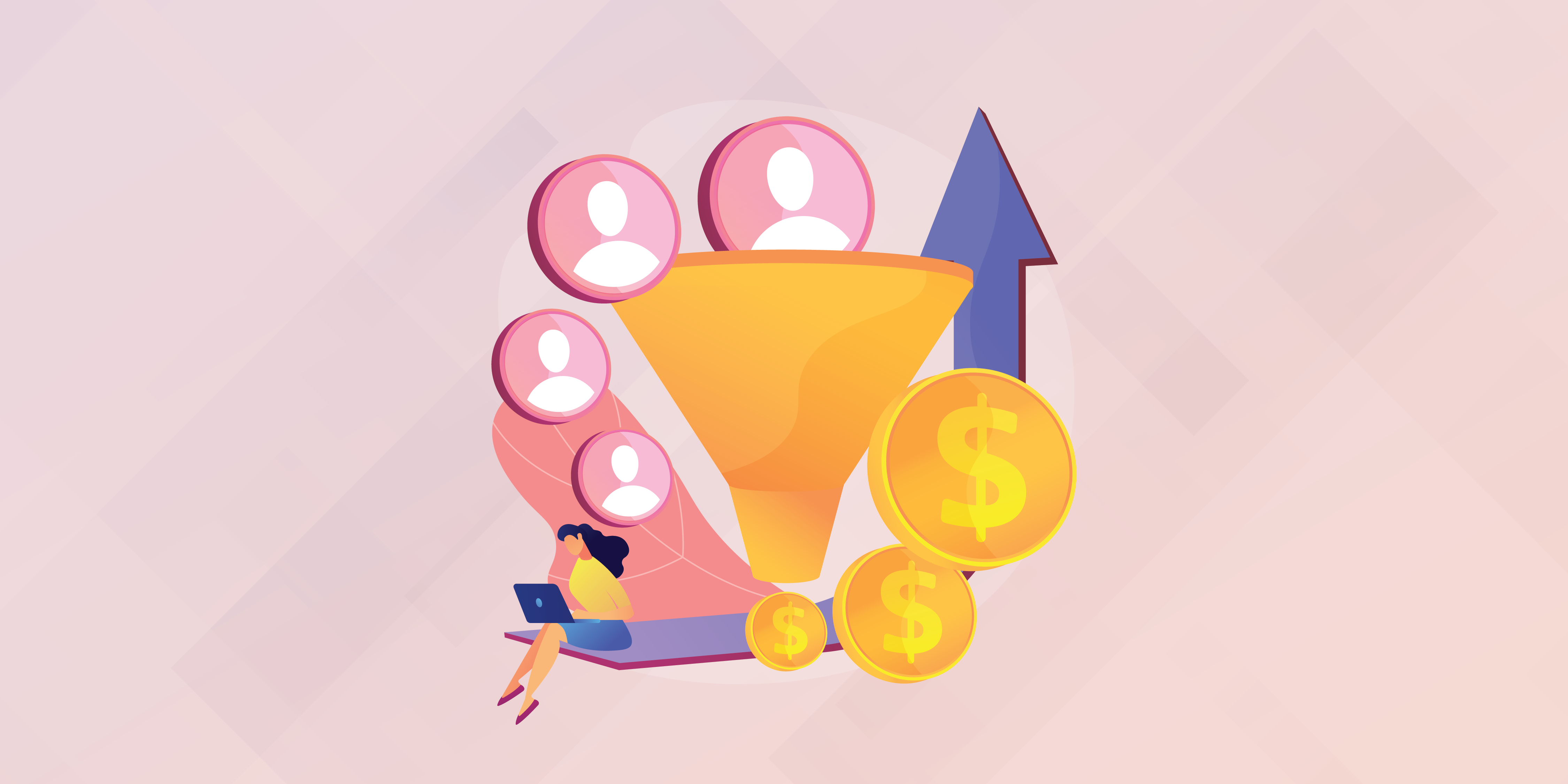
M. Usama
February 23, 2024

Hamna Abid
August 23, 2023

Hamna Abid
August 9, 2023